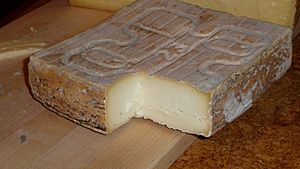Taleggio cheese facts for kids
Quick facts for kids Taleggio |
|
|---|---|
 |
|
| Country of origin | Italy |
| Region, town | Bergamo, Brescia, Como, Cremona, Lecco, Lodi, Milan, Pavia, Treviso, Novara |
| Source of milk | cow, full milk |
| Pasteurized | Frequently |
| Texture | semi-soft, smear-ripened |
| Aging time | 40 days |
| Certification | PDO |
| Named after | Lua error in Module:Wikidata at line 70: attempt to index field 'wikibase' (a nil value). |
Taleggio (say "tah-LED-jo") is a special Italian cheese named after Val Taleggio, a valley in Italy. It's a semi-soft cheese with a thin, reddish-orange crust and a strong smell. But don't let the smell fool you! Its taste is actually quite mild and a little fruity. It's a washed-rind cheese, which means its outside is washed regularly as it ages.
Contents
A Peek into Taleggio's Past
Taleggio cheese has a very long history! People have been making cheeses like it since the time of the ancient Romans. Famous Roman writers like Cicero, Cato the Elder, and Pliny the Elder even wrote about it.
For a long time, this cheese was only made in the Val Taleggio area. But by the late 1800s, some of the cheese making moved to the Lombardy plain, which is south of the valley.
How Taleggio is Made
Taleggio cheese is usually made during autumn and winter. First, milk is made a little bit sour, then a special ingredient called rennet (from milk calves) is added. This helps the milk turn into solid curds.
The cheese is then placed on wooden shelves in special rooms. Sometimes, following old traditions, it's even aged in caves! It takes about six to ten weeks for the cheese to become ready. During this time, it's washed once a week with a sponge dipped in seawater. This washing helps stop mold from growing and gives the cheese its unique orange or rose-colored crust.
Today, Taleggio is made using both pasteurized milk (milk that has been heated to kill germs) and raw milk in factories. Cheeses made in factories often look brighter and have a milder taste.
How to Enjoy Taleggio
Taleggio cheese is very versatile! You can grate it over salads like radicchio or rocket (also called arugula). It's also delicious with spices and tomato on bruschetta, which is toasted bread.
Because it melts so well, Taleggio is great in cooked dishes. You can use it in creamy risotto or melt it over warm polenta, a dish made from cornmeal.
Taleggio's Nutrients
Taleggio cheese contains many nutrients. Here's a quick look at what's inside:
| Fat content | 48% | |
|---|---|---|
| Nutritional values (per 100 g (3+1⁄2 oz)) |
energy | 1,230 kJ (290 kcal) |
| protein | 18 g | |
| fat | 25 g | |
| calcium | 460 mg | |
| phosphorus | 360 mg | |
| magnesium | 22 mg | |
| vitamin A | 450 mg | |
| vitamin B2 | 280 mg | |
| vitamin B6 | 131 mg | |
| vitamin E | 4450 mg | |
| Dimensions | 18–20 cm (7–8 in) square, height: 5–8 cm (2–3 in) | |
| Weight | 1.8–2.2 kg (3 lb 15 oz – 4 lb 14 oz) | |
See also
 In Spanish: Queso taleggio para niños
In Spanish: Queso taleggio para niños
 | Misty Copeland |
 | Raven Wilkinson |
 | Debra Austin |
 | Aesha Ash |

